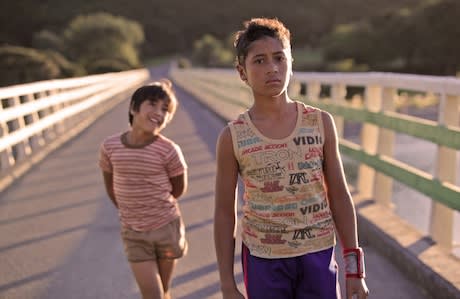In 2004, Kiwi director Taika Taititi was nominated for an Oscar for his short film, Two Cars, One Night, which, incidentally, is included with the DVD release of his feature film adaptation of it, Boy. In the short, two children sit in a car outside of a local pub in rural New Zealand waiting for their father to finish drinking and take them home. In an adjacent vehicle, a young girl does the same thing. Rather than focus on the depressing, looming subtext — children left unattended by their presumably alcoholic parents — Cars has the playful, whimsical tone associated with a child's perspective of a situation that would contextually be their status quo. Initially, the kids fight and tease each other, eventually forming an allegiance, a connection and the excitement of nascent romantic feelings. This is a tone that Boy maintains in its story of the titular child (James Rolleston) coming-of-age when his long-lost father (Waititi) comes home filled with promises and a false sense of security. Initially, our protagonist is thrilled at the arrival of his dad, driving around in his car and wearing his jacket to impress his friends, but as time progresses and he starts to see the selfish, immature nature of his parental role model, his perspective changes and his worldly innocence erodes. Similarly, Waititi's tone, while initially playful, introducing trajectory gags about trying to buy candy from the local convenience store without money and talking to a pet goat, gradually evolves into something more sombre and realist. Nothing that occurs is particularly astonishing or revelatory within the canon of coming-of-age stories, just as the deliberately idiosyncratic humour is as jarring and annoying as it is effective. But at the core of it all is a biting sense of subdued honesty about what it's like to have happy ignorance and worldly possibility swept out from under your feet. There's something devastating about watching a spirited boy full of dreams —he wants to dance like Michael Jackson, amongst other things — gradually acknowledge that the world around him isn't filled with as much wonder as he'd once hoped. Despite this, Waititi doesn't focus on the grimness entirely, ensuring that the comedy template remains, at least in part, until the final act when everyone learns a little something about themselves and each other. Also included with the DVD are some interviews and B-roll footage, which expand upon the process of adapting the short film into a very different feature-length movie.
(Kino Lorber)Boy
Taika Waititi

BY Robert BellPublished Jul 31, 2013